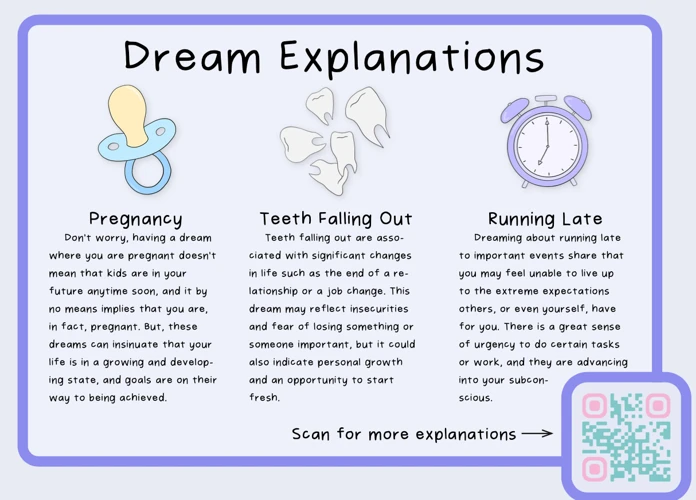Falling dreams have long captivated and puzzled individuals across cultures and time. These enigmatic dreams, accompanied by heart-racing sensations of plummeting from great heights, evoke a mix of fear and fascination. But what do these dreams signify, and how can they impact our personal growth? Exploring the relationship between falling dreams and personal development can unravel the hidden messages behind these experiences and provide insight into navigating the challenges of life. By delving into the significance of falling dreams and understanding their impact on personal growth, we can harness the transformative power they hold and embark on a journey of self-discovery unlike any other.
Understanding Falling Dreams

Understanding falling dreams requires delving into the realm of the subconscious mind and exploring the intricate workings of our deepest thoughts and emotions. Falling dreams are often associated with a sense of loss of control or instability in one’s life. The sensation of falling, accompanied by a rush of adrenaline, can result from unresolved issues or anxieties that manifest themselves during sleep. These dreams may also serve as metaphors for the ups and downs of life, mirroring the unpredictable nature of our experiences. Psychoanalytic theories propose that falling dreams can symbolize the fear of failure or a lack of support in waking life. They may also reflect the fear of letting go or losing control in various aspects of one’s life. By reflecting on falling dreams and exploring the symbolism behind them, we can gain valuable insights into our subconscious mind and uncover hidden fears, desires, and unresolved issues that impact our personal growth. To better understand the deeper meanings behind falling dreams, seeking professional dream analysis or engaging in self-reflection through journaling can provide further clarity and insights into the messages embedded within these dreams. Indeed, falling dreams have a rich symbolism and offer us an opportunity to explore and unravel the complexities of our inner world. Reflecting on these dreams can lead to a greater understanding of ourselves and potentially aid us in our personal growth journey.
The Significance of Falling Dreams

The significance of falling dreams lies in their ability to provide profound insights into our subconscious mind and emotional state. These dreams often serve as a reflection of our fears, anxieties, and unresolved issues. When we experience the sensation of falling in our dreams, it can symbolize a lack of stability or a loss of control in our waking lives. It may be indicative of our fear of failure or a need for support and guidance. The intense emotions experienced during falling dreams can also highlight areas of our lives where we feel vulnerable or overwhelmed. By paying attention to the context and emotions surrounding these dreams, we can uncover important clues about our inner struggles and areas for personal growth. Exploring the symbolism and meanings behind falling dreams can provide a deeper understanding of our subconscious thoughts and emotions. Seeking guidance from a psychoanalyst or dream expert can offer valuable interpretations and help unlock the hidden messages within these dreams. When we acknowledge and address the significance of our falling dreams, we open ourselves up to the possibility of personal transformation and growth. Understanding the significance of these dreams allows us to navigate the challenges of life with greater awareness and insight.
The Impact on Personal Growth

The impact of falling dreams on personal growth is profound and multifaceted. These dreams can serve as catalysts for transformative change, pushing individuals to confront their fears and embrace new opportunities. Here are three key ways in which falling dreams can foster personal growth:
1. Overcoming Fear and Taking Risks: Falling dreams often evoke feelings of fear and vulnerability. However, by examining and understanding the symbolism behind these dreams, individuals can confront their deepest fears and develop the courage to take risks in their waking lives. The experience of falling in dreams can provide a metaphorical platform for stepping outside of one’s comfort zone and embracing new challenges.
2. Building Resilience and Adaptability: Just as a dreamer freefalls through the abyss, falling dreams can teach individuals resilience and adaptability. These dreams simulate a loss of control, yet they can inspire individuals to navigate uncertainty and develop strategies for coping with unexpected situations. By reflecting on the lessons learned during falling dreams, individuals can cultivate a greater sense of resilience and adaptability in their day-to-day lives.
3. Letting Go of Control and Trusting the Process: Falling dreams can symbolize a lack of control and the need to surrender to the flow of life. They serve as reminders that not everything can be controlled or planned, and that it is essential to trust in the process. By embracing the uncertainty and surrendering to the journey, individuals can let go of the need for excessive control and find greater peace and personal growth in their lives.
Understanding the psychological implications of falling dreams and their relevance to personal growth empowers individuals to harness the transformative potential of these experiences. By embracing the lessons embedded within these dreams, individuals can cultivate resilience, confront fears, and ultimately embark on a journey of self-discovery and personal development.
1. Overcoming Fear and Taking Risks
Overcoming fear and taking risks is a fundamental aspect of personal growth, and falling dreams can serve as a powerful catalyst in this process. When we experience the sensation of falling in our dreams, it often triggers intense fear and panic. However, by examining these dreams from a different perspective, we can learn to see them as opportunities for growth. Falling dreams can symbolize the fear of failure or the fear of stepping out of our comfort zones. By confronting and embracing these fears, we can develop the courage to take risks in our waking lives. These dreams can push us to challenge our limitations, explore new possibilities, and pursue our goals with determination. They remind us that growth often involves venturing into the unknown and embracing uncertainties. By actively working to overcome fear and take risks, we expand our boundaries, tap into our resilience, and discover our true potential. Embracing the messages within falling dreams can empower us to step outside our comfort zones, pursue our passions, and embark on transformative journeys of personal growth.
2. Building Resilience and Adaptability
Building resilience and adaptability is a key aspect of personal growth that can be greatly influenced by falling dreams. These dreams, which often evoke feelings of fear and vulnerability, provide an opportunity to confront and overcome challenges. When we experience falling dreams, our subconscious mind is essentially testing our ability to adapt and bounce back from adversity. These dreams serve as a metaphorical training ground, allowing us to develop the skills necessary to navigate life’s uncertainties. By facing the fear of falling head-on, we learn to cultivate resilience and adaptability in the face of adversity. These dreams teach us to trust ourselves and our abilities to overcome obstacles and bounce back stronger. They push us out of our comfort zone, forcing us to confront our fears and prove to ourselves that we have the capacity to overcome even the most daunting challenges. Just as in falling dreams, where we ultimately find ourselves landing safely or even learning to fly, we can apply the lessons learned from these dreams to real-life situations. By embracing the lessons of resilience and adaptability, we can approach life’s challenges with a newfound confidence and willingness to embrace change. These qualities not only contribute to personal growth but also enable us to thrive in an ever-changing world.
3. Letting Go of Control and Trusting the Process
Letting go of control and trusting the process is an essential aspect of personal growth that can be deeply influenced by falling dreams. When we experience the sensation of falling in our dreams, it often serves as a metaphor for the fear of losing control. These dreams remind us of the importance of relinquishing our grip on the outcomes and uncertainties of life. By embracing the message behind falling dreams, we can learn to surrender our need for control and develop a sense of trust in the journey we are on.
Falling dreams challenge us to confront our fears and step into the unknown with faith. They push us to confront our vulnerabilities and insecurities head-on. When we hold onto the need for control too tightly, we limit our growth and miss out on valuable opportunities for self-discovery and transformation.
To let go of control and trust the process, we can adopt several strategies. Firstly, practicing mindfulness and being present in the moment allows us to embrace uncertainty and navigate through it with grace. By focusing on the present, we shift our attention away from trying to control the future and instead appreciate the experiences that unfold in the here and now.
Secondly, developing self-compassion is crucial in letting go of control. Recognizing that we are human and that mistakes and setbacks are a part of life allows us to release the pressure we put on ourselves to be in control at all times. Embracing self-compassion creates space for growth and acceptance, fostering personal development in the face of uncertainty.
Lastly, surrounding ourselves with a support system of trusted individuals can help us let go of control and lean on others when needed. By seeking guidance and opening ourselves up to the perspectives and expertise of others, we invite diverse insights that can enrich our personal growth journey.
By embracing the message of falling dreams and letting go of control, we break free from self-imposed limitations and open ourselves up to the vast array of possibilities that life holds. It is through this process of surrender and trust that personal growth blossoms, as we learn to navigate the uncertainties of life with resilience and grace.
Interpreting Falling Dreams

Interpreting falling dreams requires a careful examination of the various elements and symbols present within the dream. Each dream is subjective and unique to the individual experiencing it, making it crucial to consider personal associations and emotions tied to the dream. Here are some key points to consider when interpreting falling dreams:
1. Context and Emotions: Pay attention to the context in which the falling occurs. Is it in a specific location? Are there people or objects present? Additionally, consider the emotions felt during the dream. Are you scared or exhilarated? These details can offer insights into the areas of your life that may be causing anxiety or excitement.
2. Height and Speed: Take note of the height from which you are falling and the speed at which it is happening. These factors can reflect the magnitude or urgency of the situation you may be grappling with in your waking life. A slow descent might symbolize a gradual decline or loss of control, while a rapid fall could represent a sudden change or impending crisis.
3. Symbolism and Metaphors: Analyze the symbols and metaphors present in the dream. For example, falling from a tall building might signify a fear of failure or a lack of stability in your professional life. Falling from a bridge could represent a sense of being caught between choices or transition. Identifying these symbols can help uncover deeper meanings.
4. Personal Associations: Consider your personal associations with falling. What does it symbolize for you? Is it associated with freedom, vulnerability, or a sense of letting go? Understanding how falling is linked to your own experiences and beliefs can provide valuable insight into the dream’s message.
By carefully interpreting falling dreams and examining the various elements within them, you can gain a clearer understanding of the underlying emotions, fears, and aspirations that may be influencing your personal growth. Remember that dream interpretation is subjective and personal, and exploring these dreams can be a powerful tool for self-reflection and discovery.
Techniques for Harnessing Growth from Falling Dreams
Harnessing growth from falling dreams requires proactive techniques that can help us navigate and make sense of these powerful experiences. One effective technique is journaling and reflecting on the details of the dream. By recording the emotions, sensations, and symbols experienced during the dream, we can gain a deeper understanding of their significance and uncover hidden insights. Another valuable approach is seeking dream analysis from professionals who specialize in interpreting dreams. Their expertise can provide a fresh perspective and shed light on the deeper meanings behind falling dreams. Additionally, implementing action steps based on the insights gained from falling dreams can propel personal growth. This may involve taking calculated risks, building resilience, or relinquishing control in certain areas of life. By actively engaging with and integrating the lessons from falling dreams, we can harness their transformative power and facilitate our personal growth journey.
1. Journaling and Reflecting
Journaling and reflecting on falling dreams can be a powerful tool for personal growth. By putting pen to paper or typing on a digital platform, we can delve deeper into the emotions, symbols, and messages conveyed in our dreams. Journaling allows us to document the details of our falling dreams, such as the setting, emotions felt, and any recurring patterns or symbols. This process helps us gain a clearer understanding of the underlying themes and potential triggers for these dreams. Additionally, journaling provides a safe space for self-reflection and introspection. As we write about our falling dreams, we can also explore our waking life experiences and emotions that may be intertwined with these dreams. By reflecting on the symbolism and emotions associated with falling dreams, we can uncover valuable insights into our fears, aspirations, and unresolved issues. This self-reflection enables us to make connections between our dreams and our daily lives, aiding in personal growth and facilitating a deeper understanding of ourselves. Journaling allows us to track patterns and progress over time, providing a visual representation of our personal growth journey. Journaling and reflecting on falling dreams provides a therapeutic and enlightening avenue for self-exploration and personal development.
2. Seeking Dream Analysis
Seeking dream analysis can be an invaluable tool for unraveling the deeper meanings and messages hidden within falling dreams. Dream analysis involves seeking the expertise of professionals who specialize in understanding the complex language of dreams. These experts, such as psychologists or dream therapists, can provide insights and interpretations that may elude us on our own. When seeking dream analysis, it is important to find a reputable and experienced practitioner who can guide us through the process. The first step in dream analysis is sharing the details of the falling dream with the analyst. This includes describing the setting, emotions, and any other significant details related to the dream. The analyst may then ask probing questions to gain a deeper understanding of the dream’s context and personal associations. Through this collaborative exploration, the dream analyst can help uncover the subconscious symbols, themes, and personal connections embedded within the falling dream. Additionally, dream analysis can help identify recurring patterns or symbols that may appear in multiple dreams, providing further insight into our emotional and psychological landscape. By delving into the realm of dream analysis, we can gain a greater understanding of ourselves, our fears, our desires, and the obstacles that may be hindering our personal growth. It is important to approach dream analysis with an open mind and a willingness to explore the subconscious with curiosity and self-reflection. Ultimately, seeking dream analysis can be a transformative step in harnessing the growth potential of falling dreams. Whether through individual sessions or group therapy, the guidance of a dream analyst can be a valuable resource on our personal growth journey, offering new perspectives, insights, and avenues for self-discovery.
3. Implementing Action Steps
Implementing action steps is a crucial aspect of harnessing personal growth from falling dreams. While analyzing and reflecting on these dreams provides valuable insights, taking tangible actions based on those insights is what propels us forward in our journey of self-improvement. Once we have deciphered the underlying messages and identified areas for personal growth, it is essential to translate those discoveries into actionable steps that align with our goals. For example, if a falling dream symbolizes a fear of taking risks, we can challenge ourselves to confront that fear by gradually stepping out of our comfort zone and taking calculated risks in different areas of life. This could involve trying new experiences, pursuing a passion, or embracing opportunities for growth and learning. Another action step may involve developing resilience by actively seeking out challenging situations and learning from setbacks instead of letting them deter us. Building resilience provides us with the strength to bounce back from adversity and continue on our personal growth journey. Additionally, letting go of control and trusting the process may require practicing mindfulness and embracing the uncertainties of life. This can be achieved through techniques such as meditation, deep breathing exercises, or seeking support from trusted individuals. By implementing these action steps, we actively engage with the lessons and insights gained from falling dreams, propelling ourselves towards personal growth and transformation. Taking action is the catalyst that turns our dreams into reality and allows us to unlock our true potential.
Conclusion
In conclusion, falling dreams offer a unique window into our subconscious mind and provide an opportunity for personal growth. By understanding the significance of these dreams and their impact on our lives, we can navigate the challenges we face with greater resilience and adaptability. Falling dreams can help us overcome fear and take risks, building a foundation for personal growth. They teach us the importance of letting go of control and trusting the process, reminding us that growth often requires stepping into the unknown. To harness the growth potential of falling dreams, techniques such as journaling and reflecting can aid in understanding and processing the emotions and messages embedded within these dreams. Seeking dream analysis from professionals or knowledgeable individuals can also provide deeper insights. Implementing action steps based on the interpretations of falling dreams can lead to tangible personal growth and transformation. In essence, falling dreams offer us an opportunity to unravel the mysteries of our inner selves, leading to profound personal growth and self-discovery. Embracing these dreams with curiosity and open-mindedness allows us to harness their power and embark on a journey of continuous growth and self-improvement.
Frequently Asked Questions
1. Why do people experience falling dreams?
Falling dreams can arise due to a variety of factors, including stress, anxiety, or a subconscious fear of failure or loss of control. These dreams may also be influenced by unresolved issues or experiences in our waking life that manifest during sleep.
2. Are falling dreams always negative?
While falling dreams can evoke fear or discomfort, they are not necessarily always negative. Falling dreams can also be interpreted as a symbol of growth, change, or the need to let go of something in our lives. They provide an opportunity for self-reflection and personal growth.
3. Can falling dreams predict the future?
There is no scientific evidence to suggest that falling dreams can predict the future. However, these dreams can offer valuable insights into our subconscious mind and emotions, helping us uncover hidden fears or desires that might impact our future actions.
4. Can recurring falling dreams have a specific meaning?
Recurring falling dreams may indicate that there are unresolved issues or recurring challenges in our lives. The repetition of these dreams could serve as a subconscious alarm, urging us to address these issues and work towards personal growth and resolution.
5. How can falling dreams impact personal growth?
Falling dreams can impact personal growth by providing an opportunity to confront fears, develop resilience, and embrace change. These dreams can inspire individuals to overcome obstacles, take risks, and let go of control, ultimately leading to personal transformation and growth.
6. Can falling dreams be interpreted differently in different cultures?
Yes, falling dreams can be interpreted differently across cultures. Cultural beliefs, traditions, and symbolism can influence the interpretation of dreams. It is essential to consider cultural context when analyzing falling dreams and their significance.
7. Is there a way to control or manipulate falling dreams?
While lucid dreaming techniques may allow individuals to have some control or influence over their dreams, there is no foolproof method to control or manipulate falling dreams specifically. However, individuals can learn to harness the growth potential of falling dreams through various reflective and interpretative techniques.
8. Can seeking dream analysis help with understanding falling dreams?
Yes, seeking dream analysis from professionals or experienced practitioners can provide valuable insights into the symbolism and meaning of falling dreams. Dream analysis can help individuals understand the underlying emotions and messages hidden within these dreams, facilitating personal growth and self-discovery.
9. How can journaling contribute to understanding falling dreams?
Journaling allows individuals to reflect on falling dreams and explore their emotions, thoughts, and experiences associated with these dreams. By recording dreams and analyzing their patterns, individuals can gain clarity and understanding of their subconscious mind, facilitating personal growth.
10. Are falling dreams common among all age groups?
Falling dreams are reported across various age groups. While they may vary in content or intensity, falling dreams can be experienced by children, adolescents, and adults alike. The interpretation and impact of these dreams on personal growth may differ based on individual experiences and developmental stages.








